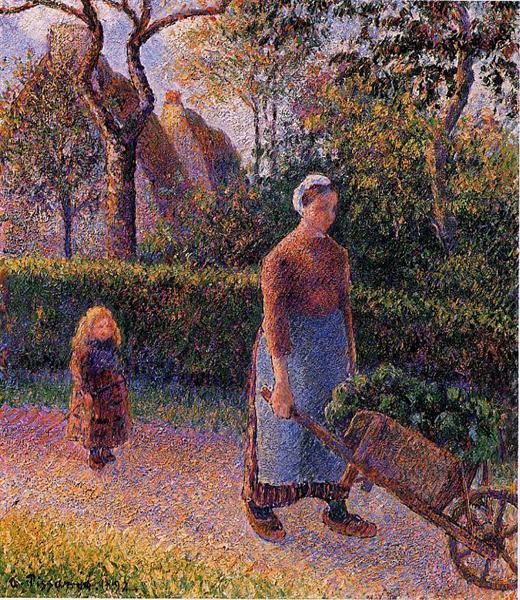Beskrivelse
In Woman with a Wheelbarrow (1892), Camille Pissarro displays his mastery in the depiction of everyday rural life, a recurring theme in his work that reflects both human labor and the essence of the environment we inhabit. This painting captures an ephemeral moment in which a woman, focused on her task, becomes the symbol of laborious rural effort, a motif that Pissarro has explored throughout his career. The woman, dressed in simple but representative attire of her time, pushes a wheelbarrow, suggesting an intimate connection between agricultural work and the dignity of the individual who performs it.
The composition is notable for its balanced structure. The figure of the woman is placed slightly in the centre, becoming the focal point of the work, while the background unfolds into an impressionistic landscape that exudes an atmosphere of serenity. Pissarro uses a rich and varied palette, characterised by earthy tones that evoke the surrounding soil and vegetation, contrasting with the blue of the sky that suggests a clear and bright day. This use of colour not only provides depth, but also conveys a sense of vitality and movement, in harmony with the woman's efforts.
The loose, rapid brushstroke technique characteristic of Impressionism is present in this work, lending it a particular dynamism. The grasses and flowers in the foreground, painted with vibrant splashes of color, seem to dance in the breeze, while the woman’s subtle shadow indicates the passing of time, a moment captured that could transcend others, inviting the viewer to contemplate the beauty of the everyday. The treatment of light and shadow becomes crucial, as Pissarro manages to evoke the warmth of the sun that bathes this rural scene.
Through the figure of the woman, Pissarro pays homage to both her role in the family and her contribution to agricultural work. The character, although anonymous, is an epitome of 19th-century rural life, at a time when France was in the midst of significant social and economic changes. The wheelbarrow, a symbol of hard work and daily struggle, stands as a central element that frames not only her effort, but also the connection between the human being and the land he cultivates.
Camille Pissarro, one of the leading exponents of Impressionism, profoundly influenced the movement with his emphasis on light and colour, as well as his portrayal of everyday peasant life. His attention to detail and deep respect for the subjects he portrayed has resulted in a body of work that continues to resonate in contemporary art. Woman with a Wheelbarrow is a clear representation of his technique and his philosophy as an artist, showing that the simple can be immensely profound and meaningful.
In the context of art history, Pissarro is considered a pioneer not only for his technique, but also for his desire to fuse beauty with real life. His work stands in constant dialogue with other Impressionist masters, although his particular focus on rural life sets him apart. When observing "Woman with a Wheelbarrow," the viewer does not simply witness a visual representation, but is transported into a world where daily struggle is dignified by art, where each brushstroke tells a story of effort and belonging. This painting continues to invite a reflection on the value of human labor and its place in nature, resonating with the echoes of a modernity that still seeks to find its balance in the world we inhabit.
KUADROS ©, a famous painting on your wall.
Hand-made oil painting reproductions, with the quality of professional artists and the distinctive seal of KUADROS ©.
Painting reproduction service with satisfaction guarantee. If you are not completely satisfied with the replica of your painting, we will refund 100% of your money.

